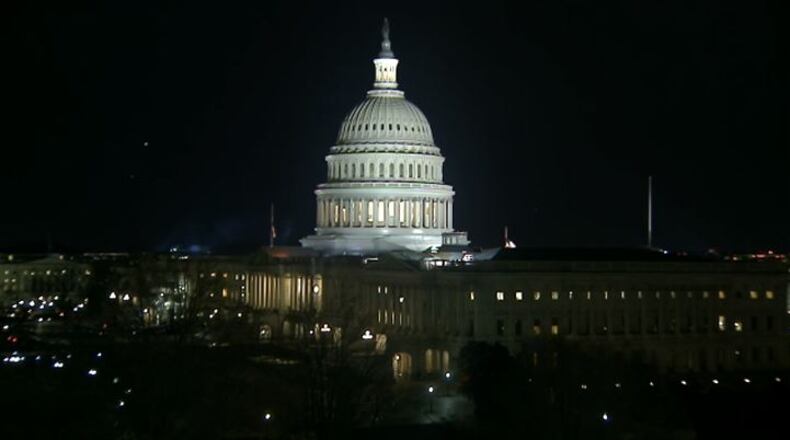The House and Senate moved swiftly on Thursday to approve a package of unfinished spending bills for 2019, as President Donald Trump signaled that he would sign the measures into law in order to avoid a second partial government shutdown on Friday night, but the White House said the President would go a step further and declare a national emergency to funnel more money into his campaign pledge for a border wall.
"President Trump will sign the government funding bill, and as he has stated before, he will also take other executive action - including a national emergency - to ensure we stop the national security and humanitarian crisis at the border," said White House Press Secretary Sarah Huckabee Sanders.
While there were sharp differences on the use of executive powers by the President to fund his signature campaign promise, there was much more bipartisan agreement on finishing work on seven different bills which fund about one-quarter of the federal government. The Senate passed the plan 86-13, while the House gave it overwhelming approval a few hours later.
As for the national emergency, it was not immediately clear what emergency laws or procedures the President would use, or what pots of money Mr. Trump would try to tap in order to divert more resources to border security efforts, which he felt were underfunded in the House-Senate deal, which gave $1.375 billion to border barriers - Mr. Trump had requested $5.7 billion.
While many Republicans also wanted more money, a number had strong reservations about the President going around Congress to take money from other areas to fund construction of a wall.
"President Trump is opening the door for any future President to act alone without Congressional approval," said Rep. Cathy McMorris Rodgers (R-WA).
But GOP leaders in both the House and Senate signaled that they would support the President on executive action to get more money for a wall.
"I support the President in declaring a national emergency," said House Minority Leader Kevin McCarthy (R-CA).
"I support President Trump using constitutional executive action to build the wall and keep our country safe," said Rep. Tom Graves (R-GA).
As for Democrats, they spared little in their in their denunciations of the President's emergency plan.
"If Trump circumvents Congress to declare a National Emergency, it would be grounds for impeachment," said Rep. Gwen Moore (D-WI).
"If the President declares a national emergency tonight, we must challenge it in court tomorrow," said Rep. Joe Neguse (D-CO).
"Declaring a national emergency is irresponsible," said Rep. Chrissy Houlahan (D-PA).
"Declaring a national emergency would be a lawless act, a gross abuse of the power of the presidency and a desperate attempt to distract from the fact that President Trump broke his core promise to have Mexico pay for his wall," said House Speaker Nancy Pelosi and Senate Democratic Leader Charles Schumer in a joint statement.
"The President’s emergency declaration is irresponsible, counterproductive, and an overreach of his constitutional authority," said Rep. Haley Stevens (D-MI).
GOP supporters of an executive 'emergency declaration' said Congress had given the President a series of legitimate options.
"There's three different statutes," said Rep. Mark Meadows (R-NC), the head of the House Freedom Caucus, who has fully endorsed the idea of unilateral action by Mr. Trump.
One example is Section 2808 of Title X, covering military construction authority in the event of a declaration of war or national emergency - there is also another section, 284, which deals with powers to combat counter drug activities.
Democrats vowed to immediately force votes in the House and Senate to overturn any emergency declaration, and threatened court action as well, as they said what Mr. Trump was planning to do was an attack on the Constitution.
"This isn’t about building or stopping the wall; it’s about defending the Constitution," said Rep. Tom Malinowski (D-NJ).
About the Author
The Latest
Featured



